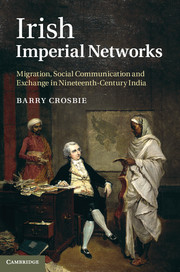Book contents
- Frontmatter
- Contents
- Preface
- Acknowledgements
- Abbreviations
- 1 Introduction
- 2 The business of empire
- 3 British overseas expansion, Ireland and the sinews of colonial power
- 4 From trade to dominion
- 5 Religion, civil society and imperial authority
- 6 From Company to Crown rule
- 7 Imperial crisis and the age of reform
- 8 Conclusion
- Glossary
- Bibliography
- Index
- References
4 - From trade to dominion
Published online by Cambridge University Press: 05 December 2011
- Frontmatter
- Contents
- Preface
- Acknowledgements
- Abbreviations
- 1 Introduction
- 2 The business of empire
- 3 British overseas expansion, Ireland and the sinews of colonial power
- 4 From trade to dominion
- 5 Religion, civil society and imperial authority
- 6 From Company to Crown rule
- 7 Imperial crisis and the age of reform
- 8 Conclusion
- Glossary
- Bibliography
- Index
- References
Summary
Introduction
Following the conquest of Bengal and the assumption of the land-revenue management from the Mughal Emperor, Shah Alam, in 1765, the East India Company’s position as a trading organisation (albeit an increasingly militarised one) was fundamentally transformed. Hereafter, the Company began to recognise its shifting position as a South Asian territorial power. For the most part, political control in late-eighteenth-century India rested upon the Company’s ability to establish a comprehensive network of surveillance and control over the Indian countryside that was based on reports from well-informed Company residents and news-writers based at Indian courts, and intelligence units and spies attached to the Company’s army. Complementing this information network was the work of Company-appointed surveyors, botanists, zoologists and geologists whose task it was to amass a dense archive of geographical and scientific data in an attempt to provide the nascent colonial power with sufficient knowledge about the new lands they had conquered. Only through their efforts could the Company truly grasp the complexity of the Indian interior, and hence exert control over its manufactures, population, land and agriculture.
Central to achieving this aim was the role of nineteenth-century Irish scientific institutions and personnel in the process of colonial information-gathering, particularly in relation to surveying and geological exploration in India. Irish people, of both Catholic and Protestant backgrounds, played a critical role in transferring and adapting systems of knowledge and practice from Ireland’s ‘laboratory’ of colonial science to India. From the mid eighteenth century, scientific endeavour in Ireland had been closely bound up with the Irish Ascendancy and landed interest and was directly linked to contemporary British utilitarian ideas of good governance, national security and colonial expansion. In a reflection of the colonial relationship that existed between Irish Protestants and Catholics (under penal law Irish Catholics were barred from holding commissions in the government and army or owning land), many Irish scientific institutions were designed with a view to enhancing the power of landowners by facilitating the augmentation of tax revenues and the exploitation of Ireland’s natural resources. This was a process that involved a high level of collaboration between the military and various different strands of Irish society, albeit in very unequal ways. By the mid nineteenth century, Ireland was arguably the first (and perhaps oldest) of Britain’s ‘colonies’ to have been subjected to a thoroughly comprehensive scientific examination; its towns, villages, hills and mountains had all been surveyed and mapped, its minerals and natural resources identified and put to use in the name of industry and ‘improvement’. At the same time, through mass imperial migration, Ireland and Irish people (both Catholic and Protestant) were at the forefront of exporting these systems of scientific knowledge and practice to India where they were adopted and used, albeit in highly modified forms.
- Type
- Chapter
- Information
- Irish Imperial NetworksMigration, Social Communication and Exchange in Nineteenth-Century India, pp. 99 - 128Publisher: Cambridge University PressPrint publication year: 2011



